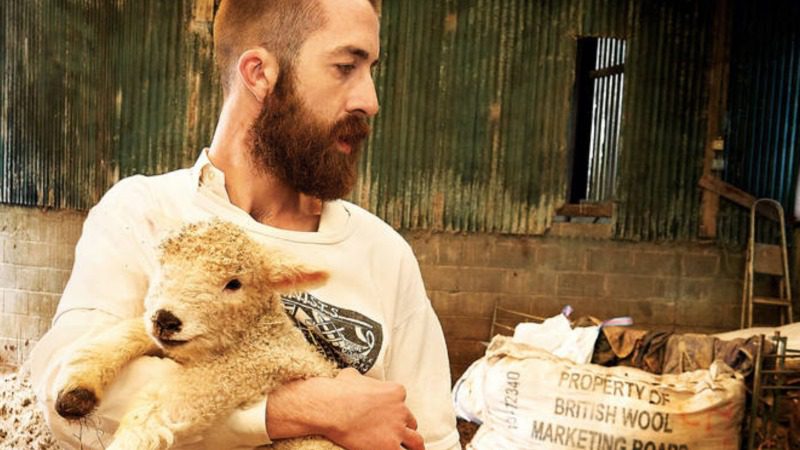Sometimes grief is a stupid, inappropriate joke at a wake; or a scream in the middle of a restaurant. It can be ugly; it’s grotesque, rude, and unwelcome; but it’s also an important part to understanding and, more importantly, appreciating life. Rarely then do we have an album that exquisitely captures all dimensions of this feeling—one that revels in the most grotesque forms of coping yet celebrates the beauty of the people, animals, and nature that surrounds its narrator. Jerskin Fendrix’s sophomore record, Once Upon A Time… In Shropshire, is equal parts ode and eulogy. Set in his rural hometown of Shropshire, England, the songs dramatize a true and personal story: the death of a friend, family members, and ultimately, Fendrix’s father within a brief moment in this place’s ancient history.
It’s a complete departure from Fendrix’s debut five years ago: Winterreise, an experimental pop album drowned in Auto-Tune and electronic production to transform post-breakup angst into a 21st-Century take on Schubert’s romantic-era song cycle. Shropshire instead returns to Fendrix’s roots as a composer. The songs’ trilling pianos and delicate violins—interrupted only briefly by stormy band crash outs (“Jerskin Fendrix Freestyle”) and electronic explosions (“Princess”, “Sk1”) —are musically warm and inviting like a film score for a period piece set in the countryside. Fendrix notably relies entirely on his raw vocals to drive the emotional performance of confronting his grief, allowing him to explore its lowest depths and highest peaks to offer theatricality and a rougher texture to the overall sound. Yet, like its predecessor, Shropshire arrives at sincerity in a complicated way: by burying expressions of profound sadness underneath a mound of superficial one-liners, delivering the most gutting lines in a straining falsetto, or just shielding his loudest thoughts behind a post-rock frenzy.
“Beth’s Farm” is a plucky, sunny introduction of a lovely, provincial town. It’s a lullaby of sorts, with Fendrix reminiscing about farm animals, holiday get-togethers, first kisses, and growing families in a sweet, high-pitched, falsetto. “I’ve never felt so in love until now,” he sings, complementing his cheeriness with the joyful, filmic quality of a violin, piano, and snappy, synthesized harmonies echoing throughout. But Fendrix skillfully refrains from diving too deep into nostalgia—opting, instead, to crack at the gilded coating of a happy childhood. Death, even when it’s supposedly not present, is all he dwells on: “There’s no pain here / There’s no blood here.” Desperation then grows as he shifts into the chorus, dropping his voice to get louder and less controlled, even cracking as he repeats, “Nobody dies on Beth’s Farm!” The subtle eeriness of this song, particularly in the way an artist with such a deep register contorts his voice to achieve that falsetto, effectively articulates how tragedy can warp one’s perception of life.
Though we have centuries of artists who’ve drawn the same conclusions about life and death, Fendrix still delivers a refreshing, profoundly humble take on the old tropes—never falling victim to trite or overly serious writing. One of the most effective aspects of Shropshire lyrically is that it acknowledges the main story’s lack of uniqueness. The penultimate ballad “Together Again” transforms a self-dubbed death song into a flowery, folksy, and witty piano-led tune. Fendrix’s tone—conveyed by a return to that sweet, higher-pitched, and energetic delivery heard in “Beth’s Farm”—lightly pokes fun at the acceptance of grieving, brushing past platitudes like “Everybody lives / Everybody dies / Everybody dies eventually” before sketching out the meatier, more vivid reflections on the fleeting nature of life.
These flashes of humor accentuate the truly sincere moments, building them up as tender, vulnerable hymns next to jaunty pubs songs, prayers, and pity-parties. “The Universe” is defined by the warmth of Fendrix’s low voice, which guides us through fond memories of parties, family breakfasts, and the lush gardens before breaking into a hoarse, near-sobbing falsetto, as he gets carried away by the things he misses. Likewise, “Last Night In Shropshire” ends the album on a heartwarming, comforting note, even if it is just a quiet stroke of the piano. Promising to memorialize the town and its people as they are, it becomes a prayer—of good health, hope and an afterlife, of carrying a part of each other as each braves the world alone. It comes as an exhale.
But Once Upon A Time… In Shropshire isn’t all about polish, and Fendrix balances his characterizations of grief with ugly indulgences. “Jerskin Fendrix Freestyle” especially cuts through the melancholic ballads “Mum & Dad” and “The Universe.” My gut reaction is to call it a fantastic absurdist joke, one that oozes with irony to deflect the vulnerability exposed in the songs before and after it. (Fendrix surprise-released it on April Fools’ Day, alongside a picture of himself giving a thumb’s up while covered in feces, so perhaps he’s aware it’s got the same function in Shropshire as a scherzo in a symphony.)
Fendrix raps on “Freestyle,” burying all of his expressions of fear and irrational guilt about death under a rapid-fire splurge of dick jokes, literature references, nonsensical one-liners, and an acrostic of his name that calls himself, among other things, poor, awkward, and impotent. Playing alongside him is a blaring post-rock band, co-composed by Geordie Greep, who brings his jazz fusion to the album’s apocalyptic sound. But for Fendrix—who once depicted imposter’s syndrome in a bombastic power-pop banger (“A Star Is Born” on Winterreise)—tonally dissonant songs often are the most thought-provoking ones on the album, and this is a manic outpouring of everything: frets about one’s education and upbringing, humor, love of nature, and inability to cope with tragedy. The freestyle embodies the album altogether: it’s a throbbing migraine personified; a proper soundtrack for a proper crashout.




